DominionSections
Browse Articles
- IndependentMedia.ca
- MostlyWater.org
- Seven Oaks
- BASICS Newsletter
- Siafu
- Briarpatch Magazine
- The Leveller
- Groundwire
- Redwire Magazine
- Canadian Dimension
- CKDU News Collective
- Common Ground
- Shunpiking Magazine
- The Real News
- Our Times
- À babord !
- Blackfly Magazine
- Guerilla News Network
- The Other Side
- The Sunday Independent
- Vive le Canada
- Elements
- ACTivist Magazine
- The Tyee
- TML Daily
- New Socialist
- Relay (Socialist Project)
- Socialist Worker
- Socialist Action
- Rabble.ca
- Straight Goods
- Alternatives Journal
- This Magazine
- Dialogue Magazine
- Orato
- Rebel Youth
- NB Media Co-op
Radio
The Battle of New Orleans
September 3, 2005
The Battle of New Orleans
Race, Class Disparity Set Stage for New Orleans Disaster
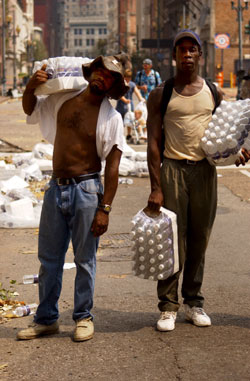 photo: DirectNIC.com
photo: DirectNIC.com"This is a national emergency. This is a national disgrace," New Orleans Emergency Operations head Terry Ebbert told the press. "[The Federal Emergency Management Agency (FEMA)] has been here three days, yet there is no command and control. We can send massive amounts of aid to tsunami victims, but we can't bail out New Orleans."
In an uncharacteristically tense interview with Louisiana Senator Mary Landrieu, CNN anchor Anderson Cooper said, "when [people] hear politicians thanking one another, it cuts them the wrong way right now, because there was a body on the streets of this town yesterday being eaten by rats because this woman has been laying in the street for 48 hours..."
New Orleans Mayor C. Ray Nagin struck a similar tone in a passionate radio interview. [click to listen]
"I don't want to see anybody do anymore goddamn press conferences. Put a moratorium on press conferences. Don't do another press conference until the resources are in this city."
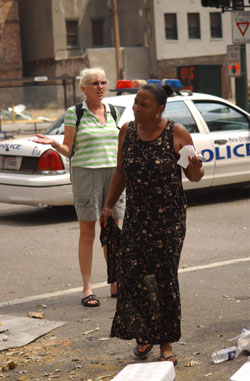 photo: DirectNIC.com
photo: DirectNIC.comResponses to the disaster seem to be split between those who are on the ground and those who are experiencing the situation from afar. A CNN report called it "the big disconnect". Political commentary web site Wonkette joked that CNN anchor Anderson Cooper had "gone native", shedding the often-mocked feigned grief of the newscaster in favour of an angry demand for accountability.
Newscasters aside, the victims are largely those who could not afford to leave the city, a group that is decidedly black and poor.
"When something happens like this, most aren't able to pack up and drive 300 miles and buy gas and check into a hotel with no credit card," Robert Bullard, founder and director of the Environmental Justice Resource Center at Clark Atlanta University told BET news.
"This is a race and class issue."
"Nearly every rescued person, temporary resident of the Superdome, looter, or loiterer on the high ground of the freeway I saw on TV was African-American," Slate editor-at-large Jack Schafer wrote.
"When disaster strikes, Americans—especially journalists—like to pretend that no matter who gets hit, no matter what race, color, creed, or socioeconomic level they hail from, we're all in it together."
"But we aren't one united race, we aren't one united class, and Katrina didn't hit all folks equally," Schafer concluded.
A few days before Hurricane Katrina hit, census data revealed that 37 million Americans were living in poverty, up from 31.6 million in 2000 a total rate of 12.7 per cent. African Americans have a poverty rate of 24.4 per cent. According to census figures, 67 per cent of New Orleans' population is black, and evidence suggests that a much higher proportion of those left behind are African Americans.
As the storm hit, the dominant account in the media was that the tens of thousands who remained in the city "chose" to stay behind. While many chose to ride out the storm, many thousands of others were unable to leave the city.
Evacuation: History Repeated
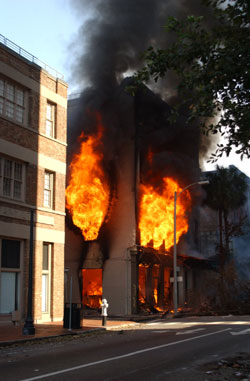 photo: DirectNIC.com
photo: DirectNIC.comCook told a reporter that one year ago, when Hurricane Ivan forced the evacuation of New Orleans in September of 2004.
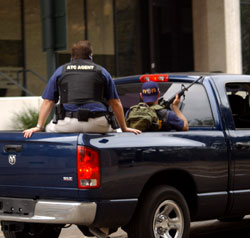 photo: DirectNIC.com
photo: DirectNIC.com"Those too poor to leave the city had to find their own shelter - a policy that was eventually reversed, but only a few hours before the deadly storm struck land."
Another local news report noted that "approximately 80,000 residents... had no way to get out of the city" during Hurricane Ivan.
According to one eyewitness account, "Three days ago, police and national guard troops told citizens to head toward the Crescent City Connection Bridge to await transportation out of the area."
"The citizens trekked over to the Convention Center and waited for the buses which they were told would take them to Houston or Alabama or somewhere else, out of this area."
"It's been 3 days, and the buses have yet to appear."
New Orleans resident Jordan Flaherty wrote that buses stopping in at refugee camps continue to be haphazard and unorganized. "When a bus would come through, it would stop at a random spot, state police would open a gap in one of the barricades, and people would rush for the bus, with no information given about where the bus was going," wrote Flaherty.
"I was told that if you boarded a bus bound for Arkansas, even people with family and a place to stay in Baton Rouge would not be allowed to get out of the bus as it passed through Baton Rouge."
In an interview from the refugee-filled New Orleans Convention Centre, NBC photojournalist Tony Zumbado said that Harry Connick Jr., a well known musician, was the "only person of authority... to go in there and tell them that things are going to be ok."
"I don't want to sound negative against anybody or any official," Zumbado continued, but "[officials] left and they're there on their own -- there's no police, there's no authority."
Zumbado described the scene: "Dead people around the walls of the convention center, laying in the middle of the street in their dying chairs. ... They were just covered up ... Babies, two babies dehydrated and died. I'm telling you, I couldn't take it."
Was Flooding Preventable?
In June 2004, the New Orleans Times-Picayune reported: "For the first time in 37 years, federal budget cuts have all but stopped major work on the New Orleans area's east bank hurricane levees, a complex network of concrete walls, metal gates and giant earthen berms that won't be finished for at least another decade."
The Chicago Tribune followed up on September 1, 2005: "Despite continuous warnings that a catastrophic hurricane could hit New Orleans, the Bush administration and Congress in recent years have repeatedly denied full funding for hurricane preparation and flood control."
The Tribune report attributed funding cuts "in part" to the cost of the war on Iraq, and cited documents from the Army Corps of Engineers that showed that seven contracts had been delayed.
"I'm not saying it wouldn't still be flooded, but I do feel that if it had been totally funded, there would be less flooding than you have," former Republican Mississippi congressman Michael Parker told the Tribune. Parker headed the Army Corps of Engineers until March 2002, when "he was ousted after publicly criticizing a Bush administration proposal to cut the corps' budget."
On the day the hurricane hit, the Times-Picayune declared: "No one can say they didn't see it coming."
In an exclusive interview broadcast on ABC's Good Morning America, George Bush said "I don't think anyone anticipated the breach of the levees."
The interviewer, Diane Sawyer, did not pursue the line of questioning any further.
"This is what happens when there is a natural disaster of this scope," First Lady Laura Bush said while touring a refugee camp.
Many critics and journalists disagree.
At least one commentator compared the US relief effort to that of Cuba, which was hit by a Category 5 Hurricane Ivan last year. Despite seas that "surged 600 metres inland," 1.3 million people were successfully evacuated, amphibious tanks were used to retrieve people in flooded areas, and no deaths were reported.
Iraq Comparisons
The situation in New Orleans has been repeatedly compared to that in Iraq.
Admitting that he would "probably get in a whole bunch of trouble," Mayor Nagin made one of many comparisons. "Did the Iraqi people request that we go in there? Did they ask us to go in there? What is more important?"
"We authorized $8 billion to go to Iraq lickety-quick. After 9/11, we gave the president unprecedented powers lickety-quick to take care of New York and other places... You mean to tell me that a place where you probably have thousands of people that have died and thousands more that are dying every day, that we can't figure out a way to authorize the resources that we need? Come on, man."
"It's downtown Baghdad," tourist Denise Bollinger told the Associated Press, referring to looting. "It's insane."
When looters trashed government buildings, libraries, museums and stores following the US bombing of Baghdad in April of 2003, Secretary of Defense Donald Rumsfeld told the press that "Freedom's untidy, and free people are free to make mistakes and commit crimes and do bad things."
Following the appearance of gangs of looters in New Orleans, Louisiana Governor Kathleen Blanco declared a shoot-to-kill policy for anyone found looting. "These troops are battle-tested. They have M-16s and are locked and loaded. These troops know how to shoot and kill and they are more than willing to do so if necessary and I expect they will," Blanco added. Many of the National Guard soldiers being deployed are returning from tours in Iraq.
Some critics have said that officials are more concerned with protecting private property than saving lives.
The looting has unleashed invective from some commentators, who have referred to looters as "vermin" and "animalistic" and declared that they need to be "blown apart". 1,500 police were diverted from rescue operations and reassigned to "anti-looting duty".
A wave of popular outrage forced apologies from news services when captions on wire photos of white people taking items from a convenience store were labelled "finding", while similar photos of African Americans were marked as depicting "looters".
Pre-existing racial and class-based tension appeared to flare up with the looting, a dynamic left implicit in most reports. "To be honest with you, people are oppressed all their lives, man, it's an opportunity to get back at society," one young New Orleans native told the Associated Press.
Another man, reportedly seen carrying ten pairs of jeans in his arms, yelled "that's everybody's store" when questioned by a reporter.
Few media reports, however, have highlighted the oppressive poverty that predated the Hurricane. New Orleans resident Jordan Flaherty describes the city:
The city has a 40% illiteracy rate, and over 50% of black ninth graders will not graduate in four years. Louisiana spends on average $4,724 per child's education and ranks 48th in the country for lowest teacher salaries. The equivalent of more than two classrooms of young people drop out of Louisiana schools every day and about 50,000 students are absent from school on any given day. Far too many young black men from New Orleans end up enslaved in Angola Prison, a former slave plantation where inmates still do manual farm labor, and over 90% of inmates eventually die in the prison. It is a city where industry has left, and most remaining jobs are are low-paying, transient, insecure jobs in the service economy.
Racism: On What Scale?
Contemporary racism can usually only be imputed from facts like those cited above, due to the sensitivity of most public figures to the political cost of making overtly racist statements. However, this was not always the case.
New York Times columnist David Brooks recently wrote that the great Mississippi flood of 1927 "ripped the veil off the genteel, feudal relations between whites and blacks, and revealed the festering iniquities."
"Blacks were rounded up into work camps and held by armed guards. They were prevented from leaving as the waters rose. A steamer, the Capitol, played 'Bye Bye Blackbird' as it sailed away. The racist violence that followed the floods helped persuade many blacks to move north."
While there were no reports of "Bye Bye Blackbird" playing on the stereos in SUVs of wealthy New Orleans residents who fled the city, racial politics continue to permeate the social fabric of the southern United States.
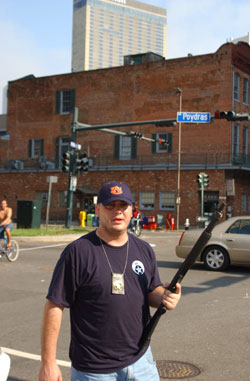 photo: DirectNIC.com
photo: DirectNIC.com"Even when there's no natural disaster, Blacks have lived the closest" to polluted sites, Robert Bullard told BET News. "These issues have been exacerbated by the hurricane. So now you have a combination of things coming together, flooding and the mix of pollutants. A hurricane releases all that stuff."
"Then when you talk about a group of people who lack health insurance and homeowner's insurance, when something like this happens, you know just who is going to be the most vulnerable," Bullard added, calling the sites a product of "environmental racism".
"Let's see who gets the levees put back in first. It's downtown, the French Quarter. It's sure not going to be the neighborhoods," said Bullard.
While the exact impact of racism is difficult to determine, the status of funding to flood-prevention efforts and wetland restoration suggest, for many commentators, that the predominantly black and disproporionately poor New Orleans is the victim of a broader systemic racism. Though it is rarely discussed, few argue that the poor and oppressed have the political capital necessary to compete for the federal funding and social programs that often go to wealthier cities and neighbourhoods.
A Political Problem?
As news of the grave situation in New Orleans spreads and the scene becomes the international disgrace of a superpower in addition its status as an ongoing humanitarian tragedy, a political battle is being fought over the meaning of the event. While criticisms of the lack of response at all levels of government increase, counter-accusations of "politicization" are flying.
"This is a time when the whole country needs to come together to help those in the region, and that's where our focus is," White House Press Secretary Scott McClellan said at a press conference. "This is not a time to get into any finger-pointing or politics or anything of that nature."
Mayor Nagin took the opposite approach. Asked what people could do to help those stuck in New Orleans, Nagin responded: "Organize people to write letters and make calls to their congressmen, to the president, to the governor. Flood their doggone offices with requests to do something."
"This is ridiculous," the Mayor added.
» San Francisco Bayview: 'This is criminal': Malik Rahim reports from New Orleans
Related articles:
By the same author:
Archived Site
The Dominion is a monthly paper published by an incipient network of independent journalists in Canada. It aims to provide accurate, critical coverage that is accountable to its readers and the subjects it tackles. Taking its name from Canada's official status as both a colony and a colonial force, the Dominion examines politics, culture and daily life with a view to understanding the exercise of power.